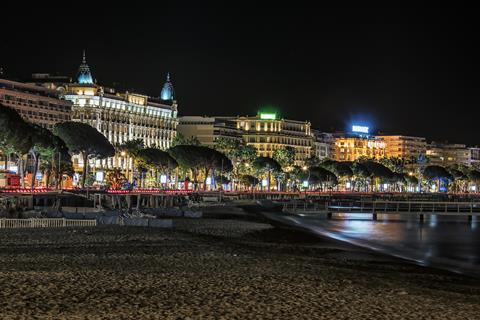Doing his Mipim wrap-up on the London Stand, Paul Finch, editorial director of Architects’ Journal, referred to the UK housing crisis as having gone on so long that it was more a condition than a crisis.

He pointed to exhibitor Egypt, which said it was building 350,000 new affordable homes this year and 300,000 middle-income homes. He suggested that London’s ‘invisible’ mayor should visit Egypt to see how they are achieving this.
He also summed up the view, heard often over the last few days, that ‘London is open for business but the people running London aren’t here’. To be fair, those who were here, including deputy mayor Jules Pipe, have worked tirelessly to promote London.
On a positive note, the Royal Town Planning Institute was here for the first time led by chief executive Victoria Hills, putting planning at the heart of promoting the UK.
The day started with the BPF breakfast panel themed around the challenges and catalysts in city regeneration. An excellent panel chaired by Property Week editor Liz Hamson included L&G head of real assets Bill Hughes, who highlighted the challenge of finding constructive partnerships between the public and private sector with both understanding the risks. “Some cities are more constructive. Some are intransigent, and in those cases we walk away,” he said. He also commented that government needs to make local authorities ensure their local plans are more visible so we know where to engage.
Next up was a fascinating City of London Corporation and City Property Association panel to mark the launch of their ‘London in a changing world’ report. Another excellent line-up included British Land chief executive Chris Grigg, James Young of Cushman & Wakefield, Joe Tasker, David Ainsworth, City Property Association President and WeWork’s David Kaiser, led by the City’s ubiquitous Catherine McGuinness. We were treated to some key stats.

Did you know that 40% of London’s tech workers come from overseas? London is in a war for talent where the quality of workspace really matters. The report is definitely worth a read. Grigg reminded us that the sector is now talking about ‘the customer’ whereas 10 years ago we weren’t interested in what was going on in our buildings. (And when I finished my MBA in 2001 we didn’t even know who the customer was!)
Kaiser talked about the feedback WeWork gets from members (customers). He highlighted the difficulty of attracting and maintaining talent and the importance of upskilling the workforce. WeWork has acquired a coding school and is rolling out coding programmes in some locations. Education will become more important, he said. Absolutely right, especially with the advances of AI. He also said that 50% of the start-ups in WeWork are female, which is an impressive ratio.
From the audience, Henry Taylor a director of RealRec, a specialist real estate sector recruiter, quizzed the panel on the roles they saw becoming more important over the next three to five years. The panel thought that 42% of those roles had not been created yet and warned that real estate would be competing with tech and other non-property companies for the same job skills. Yet more reasons for getting on with upskilling our workforce.
After a quick catch-up with IPSX on the London Stand, it was time for Patricia Brown‘s informal London 3.0 lunch. She had trailed this by saying she was assembling some brilliant minds to discuss what change we needed to plan for in London. I’m not sure how I slipped in but it was good to have Sir Eddie Lister join us as he has such depth of experience in numerous London roles over such a long period. A theme of the discussion was that we cannot afford to rest on our laurels. We have more competition now both from the regions and other global cities so this is the time for a coherent message for London. This sounds like a job for Ms Brown! Thank you to Trowers & Hamlins for hosting.
The afternoon was spent visiting some of the other stands including Manchester, which had a tremendous buzz. This may have been because the inimitable Tom Bloxham of Urban Splash was corralling a panel discussing the exciting new home, the Factory, planned for the Manchester International Festival.
Then it was time for the final-night celebrations, which kicked off with the James Andrew champagne reception, which this year was co-hosted by United Trust Bank. This was the only Mipim party at which smoked salmon was served. The room was absolutely packed, with guests enjoying themselves so much that they showed no sign of leaving at the appointed carriages time.
We then spent the rest of the evening at La Petite Maison, my favourite Cannes restaurant. However, having had my menu choices pre-determined by set menus at the week’s Mipim events, I found it difficult to get back to making my own decisions! I have to say, I can’t think of a better combination of real estate and proptech companions to have dinner with (and play Tom Bloxham’s version of the truth game). Thank you Charlie Green, Savannah de Savary, Aaron Block, Tom Bloxham, Angelica Donati, Dan Hughes and Tyler Goodwin for making the last night of Mipim such fun.
I think I finally managed to bring real estate and proptech together at Mipim. Hopefully next year we can do more to integrate the growing international proptech and innovation agenda with the rest of the exhibitors. I hope you have enjoyed this week’s Mipim blogs. If so please follow me on Twitter @Propertyshe for an ongoing commentary on all things real estate and proptech.





























No comments yet